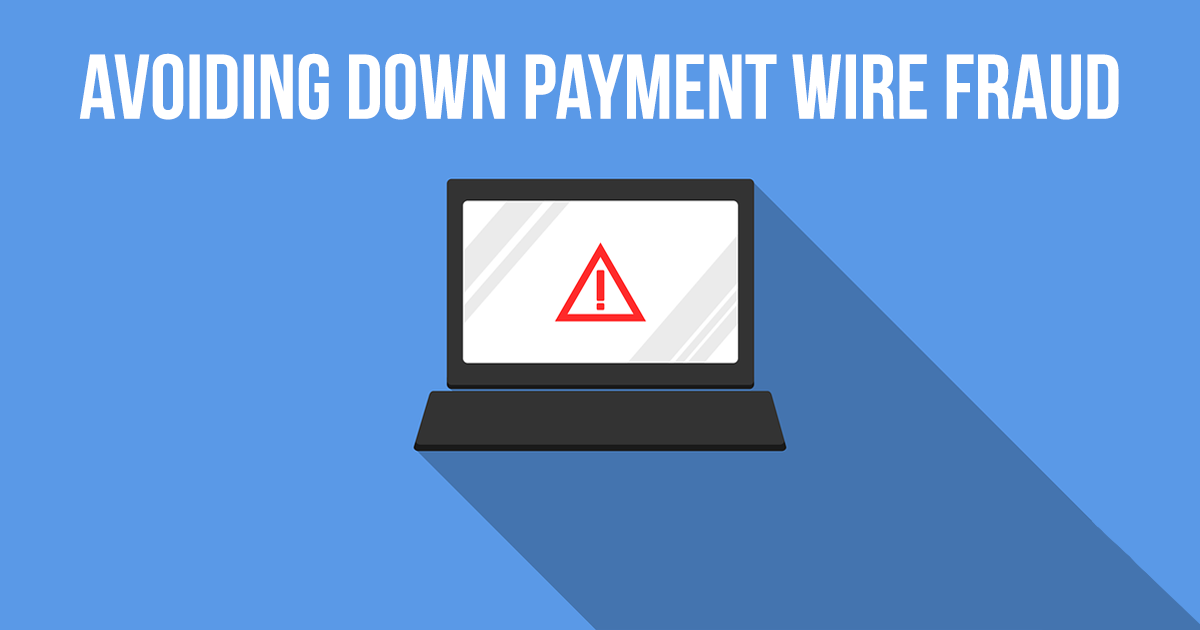Avoiding Downpayment Wire Fraud
Stop Scammers From Stealing Your Down Payment
A hot new scam targets home buyers: down payment wire fraud.
Hackers send bogus emails, telling buyers where to wire the down payment money. The stolen money disappears. The home buyer ends up with an empty bank account and a broken heart.
Hundreds of millions of dollars have been stolen this way. But you can avoid that fate by making one phone call. It’s that simple.
How the mortgage scam happens
Stacy Hennessey, a real estate agent in Falls Church, Virginia, was targeted with this scam, but she didn’t fall for it. If you follow her example, you won’t get defrauded, either.
Hennessey was buying a house in Maryland. About a week before the scheduled closing, she received an email that appeared to be from her real estate agent. The email told her that the instructions for wiring the down payment had changed, and it gave her an account number to which she should send $30,000.
Hennessey was suspicious for three reasons:
“They were asking me to wire an incorrect down payment amount, lower than it should have been,” she says. “Why would I wire a partial deposit?”
“And why would I be doing it now, several days before closing?” Usually, the down payment money is wired the day before closing.
The sender’s email address was almost, but not quite, her agent’s email address.
How to stop the scammers
Hennessey prevented crooks from stealing her $30,000 by making one call to her real estate agent.
“I said, ‘Hey, did you send me this telling me to wire money?’ And they said, ‘No.’ And I said, ‘Your computer’s been hacked because they know that I’m a buyer, closing soon.’”
Had Hennessey followed the scammer’s instructions, she almost certainly would have lost the money. At the time, she didn’t even know whom she should have called if she had fallen for the scam.
If you get tricked, drop everything and call your bank immediately. After that, contact the FBI and the Federal Trade Commission, in that order.
Rise of down payment fraud
The FBI investigates and tracks this scam, reporting that the number of complaints to title companies exploded 480% in 2016. Down payment wire fraud is one of many scams involving hacked email accounts and fraudulent wire transfers, often occurring within businesses or between businesses.
In 2016, this category of fraud held 16th place in terms of the number of reported complaints (12,005) but held first place in dollar losses (over $360 million). Most of the money ends up in Asia.
Don’t trust, always verify
“Consumers need to be suspicious when wiring large amounts of money to purchase a property,” says Cynthia Blair, a residential real estate closing attorney in Columbia, South Carolina.
Most important, Blair says: “No matter where you get the wiring instructions, you still call and verify.”
If it looks like the email came from your real estate agent, call the agent. If the email appears to have come from a title agency, escrow company or lawyer’s office, call that office to confirm, and then call your agent, just to be sure.
But do it smart: Look up phone numbers yourself. Don’t call a phone number listed in the email. Assume a scammer will answer and say, ‘Yes, those are our wiring instructions,’” Blair says.
How to tell real from fake
If your real estate agent or a settlement company emails you money-wiring instructions, complete with an account number, they’re doing it wrong.
A joint warning to consumers last year from the FTC and the National Association of Realtors said: “If you’re buying a home and get an email with money-wiring instructions, STOP. Email is not a secure way to send financial information, and your real estate professional or title company should know that.”
It’s preferable to convey wiring information in person or by courier.
Blair says her law firm has a signature block at the bottom of every employee’s email that says, in red text, that the firm will never change its wiring instructions.
And when you’re wiring money, ask your bank to confirm the account number and the name on the receiving end, the American Land Title Association recommends in an animated video. Then, immediately after the money is sent, call your agent or the title company to verify the money was received.
If you fall for wire fraud …
You might be able to claw back your money if you act minutes or even hours after falling prey to this scam. Call your bank and emphasize that you are a victim of fraud and tell your bank to contact the recipient bank to inform it that a fraudulent wire was sent and that it should reject the wire.
Report the crime
Here’s how to report the crime:
Report the scam to your regional FBI office. Say that you’re a home buyer and that you’re a target of “email account compromise” in which a hacker instructed you to wire down payment money to a fraudulent account. According to the FBI, the bureau might be able to help return or freeze the money.
File an online complaint with the FBI’s Internet Crime Complaint Center.
File a complaint with the FTC by selecting Scams and Rip-offs, then Impostor Scams.
Don’t hesitate and don’t feel ashamed. Thousands of people fall victim to this crime. By being vigilant and by making a phone call or two, you can ensure that your down payment ends up in the correct bank account.
The article Stop Scammers From Stealing Your Down Payment originally appeared on NerdWallet.
Home Equity Explained
Home Equity Explained: What It Is and Why It Matters
It is often said that homeownership builds wealth. So, what is home equity, and how can it enhance your net worth?
What is home equity?
Building home equity is a bit like investing in a long-term instrument, like bonds. Your money is, for the most part, locked up and not spendable. There are some ways to tap it, but wealth is created over years as your share of “free and clear” ownership of the house increases.
Home equity, by definition, is the current market value of your home, minus what you owe. You’re looking for a positive number there. Any gain comes from:
Paying down the principal on your loan
An increase in market value over time
It seems simple enough, but it’s not guaranteed. Just ask any homeowner who went through the most recent housing bust. When a housing bubble bursts, home equity can be an elusive concept, especially in underperforming housing markets, or if considered over the short term.
As a rule, building home equity is a slow climb, at best. U.S. residential year-over-year home price appreciation averaged just 1.89% over the last 20 years, adjusted for inflation, according to CoreLogic, the Bureau of Labor Statistics, and the Urban Institute.
However, behind that average are some major year-over-year price swings during the same period, ranging from +12.6% to -18.1%, according to the Urban Institute. When it comes to short-term home appreciation, sometimes it’s more of a bungee jump than a climb. It’s a good thing your home’s value isn’t texted to you monthly.
Why is home equity important?
The gradually expanding value of a home is a financial resource that can gain momentum over time. Because mortgage payments reduce the debt as the asset itself gains worth, paying on a house has been called “a forced savings account.” This is unlike virtually every other type of asset purchased with a loan, such as vehicles, which lose value while you pay them off.
A growing number of U.S. homeowners are amassing “impressive stockpiles” of home equity wealth, according to Daren Blomquist, senior vice president at ATTOM Data Solutions, in a recently released study.
At the end of the second quarter of 2017, there were more than 14 million American properties considered “equity rich” — meaning the debt on the property was 50% or less of the home’s current market value.
That’s about 24% of all owner-occupied homes with a mortgage.
Home equity takes time to build
Another nutrient helping to grow home equity wealth is time. Homeowners who stay in their homes longer are more likely to accrue equity.
In the second quarter of 2017, people selling their homes had lived there an average of more than eight years. That was the longest ownership period since ATTOM began tracking homeownership tenure in 2000. Before the recession, people were staying in their homes an average of about four and a quarter years, ATTOM data show.
“That’s a paradigm shift — a more conservative approach to homeownership and building wealth through homeownership,” Blomquist tells NerdWallet.
The study found that over 45% of properties owned for more than 20 years were equity rich. However, that number seems remarkably low, considering the long period of ownership.
“Keep in mind these are the subset of owners who still have an outstanding mortgage,” Blomquist says. “Our data shows 40% of all homeowners who have owned more than 20 years own their properties free and clear, compared to 34% of all homeowners.”
Blomquist says it is also a testament to just how widespread the ripple effects from the housing crash of the last decade have been.
“Many of these homeowners of 20-plus years lost huge amounts of equity during the downturn as home values plummeted 30% nationwide and much more in some markets — a deep hole to dig out of even with the strong market recovery of the last five years,” he says.
Just 10% of homes owned for less than one year are considered equity rich, according to ATTOM.
How does a home equity loan work?
You don’t have to sell to tap the profit inside your home. Instead, you can borrow against that value with a home equity loan or line of credit. A loan will provide you a lump sum; a HELOC allows you to draw on the available balance as you wish.
While the establishment of home equity lines of credit is increasing — in fact, they’re at an eight-year high — there are now one-third fewer HELOC accounts than during the prior housing market peak, in 2005.
Blomquist believes there is a new, cautious attitude to tapping home equity among today’s homeowners. And such a conservative approach is yet one more important component to building wealth.
» MORE: The pros and cons of home equity lines of credit
Home equity is not a get-rich-quick scheme
Building home equity is definitely a long-term proposition. Blomquist says wise words from one of his relatives may state it best.
“My wife’s great-grandfather — who bought property in Southern California a long time ago — his advice was, ‘You take care of a piece of real estate for 20 years, it’ll take care of you forever.’”
The article Home Equity Explained: What It Is and Why It Matters originally appeared on NerdWallet.
What Are Contingencies?
How Contingencies Protect a First-Time Homebuyer
When buying a home, there are seemingly hundreds of details to attend to, especially as a first-time homebuyer. Those details can range from the critical to the merely inconvenient, from property lines to pets. One important matter you’ll encounter is that of the contingency.
“Contingencies are your ‘out’ clause,” says Tim Freund, a real estate broker in the Los Angeles area. “They allow a buyer to get out of an agreement legitimately.”
But you want to buy a house, not get out of a deal. What’s that about?
Common contingencies
Contingencies are your built-in buyer protection plan, placing conditions on the sale that ensure you’re not taken advantage of. The most common contingency is a physical inspection, which allows buyers to determine whether there’s an issue with the home that’s bigger than they’re willing to tackle. That could be a leaky roof, a crumbling foundation — or a transmission line buried in your backyard.
Other conditions of a sale can include confirming the seller has clear title — ownership that is not bound by a lien or undisclosed debt.
But Freund says perhaps the most important contingency is loan approval. If you are unsuccessful in qualifying for a mortgage, for whatever reason, you can cancel the deal without penalty. Most importantly, that can mean recouping your earnest money on deposit.
Home value contingencies — and hot markets
Another common contingency, especially in an appreciating market, is the property appraisal.
In a hot market, it’s common to face a bidding war for a house, pitting you against other potential buyers. In that case, you are likely to offer more than the list price. If you win the bid, but the house appraises for a value below your offer, you’ll have to make up the difference between the purchase price and what your home loan will cover.
Freund says there are four possible outcomes in this scenario:
The seller agrees to reduce the price to the appraised value (don’t hold your breath)
You’ll have to kick in additional cash to make up the difference
You and the seller can agree to a compromise sales price plus additional cash
The purchase agreement is canceled
Although contingencies protect the buyer, placing too many conditions on a purchase can take you out of the running for a home, especially in a seller’s market. In such circumstances, Freund says your Realtor might counsel you to shorten contingency time frames, or in some cases even waive the appraisal contingency.
Clearing contingencies
Releasing or clearing a contingency removes a condition of the sale and pushes the purchase process forward. Freund says that’s when a prompt closing becomes important. He gives an example:
Say the buyer of a townhome is approved for a loan, with property inspection and all other due diligence complete. Contingencies have been released, and a 30- or 45-day escrow is in place.
“They get 30 days into it and the stock market drops by 10% — and they just lost their down payment,” Freund says. “So now the buyer wants to cancel. But they’ve lifted their contingencies, which means their deposit is now subject to forfeiture.”
Before lifting contingencies, buyers can legitimately back out of a purchase and, 99% of the time, get their entire deposit back without penalty, he says. That’s why real estate agents prefer quick closings, such as within 30 days — rather than stretching it out to 60 or even 90 days.
Homebuyer beware
Other contingencies include:
Inspection and repairs: A qualified home inspector tells you what needs to be repaired or upgraded in the home. You can often negotiate for some major items to be addressed by the seller.
The sale of a prior home: You need to sell your home before you buy another.
Natural hazards: These are revealed in legally required seller disclosures and can include divulging that a property is in an earthquake zone or flood plain.
Insurability: For example, if you find out the property is in a flood zone, can it be insured? And if so, how much will it cost?
Avoiding problems large and small
Some properties are bound by rules and restrictions put in place by homeowners associations, or HOAs. These neighborhood organizations provide amenities and protect property values. That could include maintenance of elevators in a high-rise condo building, or the construction and upkeep of common areas, such as lobbies, clubhouses or playgrounds.
“Maybe the homeowners association doesn’t have adequate reserves,” Freund says. If that’s the case, “every time something needs to be repaired, there’s a special assessment because they don’t have any reserves to pay for the roof or the painting, or whatever it might be.”
But it’s not always major issues that kill a deal. Backing out of a purchase can be a matter of something physical, financial — or even furry.
“Just a week ago, I had a deal fall apart because the homeowners association document said that an owner could ‘reasonably have two dogs on the property’ — and my client had three dogs,” Freund says. “They canceled.”
Contingencies can be a buyer’s best friend.
This article originally appeared on NerdWallet.
Danelle McMaster
Phone:+1(605) 228-5494



